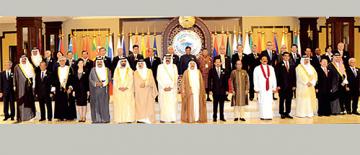
On 15-17 October 2012, Kuwait City hosted the Asia Cooperation Dialogue (ACD) Summit with the participation of the heads of 31 Asian countries, who gathered to exchange dialogue on various political, social, economic, scientific and media issues.
UN Under-Secretary General and ESCWA Executive Secretary Rima Khalaf delivered the statement of the international organization’s Secretary-General (SG), Mr. Ban Ki-moon, in which he stated that Asia “continues to lead the world in growth and is contributing greatly to a global recovery. However, the region still faces daunting development challenges. Asia still suffers from destabilizing conflicts, border disputes, environmental challenges and exposure to natural disasters. Addressing these issues requires closer regional cooperation.”
While Ban considered that regional cooperation is still critical to regional stability, he said that the gradual opening of political space and a growing respect for human rights across Asia help in creating a room for more effective regional mechanisms. The ongoing political changes in the Arab region have further demonstrated the importance of inclusivity in economic, political and social development.
The Secretary-General noted in his statement that the UN and its regional commissions have long supported regional cooperation, recalling the important role played by the regional mechanisms in achieving the Millennium Development Goals. He also underscored the final outcome document of Rio+20 Summit held in June 2012, which called on the UN regional commissions to promote a balanced integration of the economic, social and environmental dimensions of sustainable development.
At the end of the Summit, participants announced the mobilization of $ 2 billion to support the Asian development projects, of which $300 million were donated by Kuwait. In this context, the Emir of Kuwait, Sheikh Sabah Al-Ahmad Al-Sabah, said, “what was achieved in this Summit of understanding common issues will contribute to undoubtedly promoting the coordination and cooperation in the coming steps of work. The meetings held for the past two days reflected awareness of the amount of the grave responsibility given to us and accurate diagnosis of the problems that hinder the development of our countries and our continent, as reflected genuine will on the promotion of access to what we aspire to the best of our homelands and the benefit of our peoples.”
As for the ACD Forum Coordinator-General, Thai Prime Minister Yingluck Shinawatra, she said that the ACD was the only platform that reunited all states and regions of the continent, and was considered an opportunity to gather all efforts for the Asian continent to obtain its position in the world and play an exceptional role. She also stressed on the importance of harnessing the opportunities that push in the direction of the Asian unity; the development of Asian cooperation in order to reach tangible results; and the coordination of communication in the field of food and energy security and education related work. Shinawatra clarified that a summary of the goals of the upcoming summit to be hosted by Thailand by 2015 will be presented, and will be identifying the Asian cooperation mechanisms and structures.
The Asian Cooperation Dialogue (ACD) was created in 2002 with the aim of promoting Asian cooperation at a continental level and to help integrate several regional cooperation organizations such as the Association of East Asian States (ASEAN), South Asian Association for Regional Coordination (SAARC) and the Gulf Cooperation Council (GCC).
The ACD main objectives are the promotion of interdependence among Asian countries in all areas of cooperation by identifying Asia’s common strengths and opportunities; the expansion of the trade and financial market within Asia and the increase of the bargaining power of Asia countries in the global market. The ACD is also intended to serve as the missing link in Asian cooperation; and ultimately to transform the Asian continent into an Asian Community that can interact with the world on a more equal footing.





